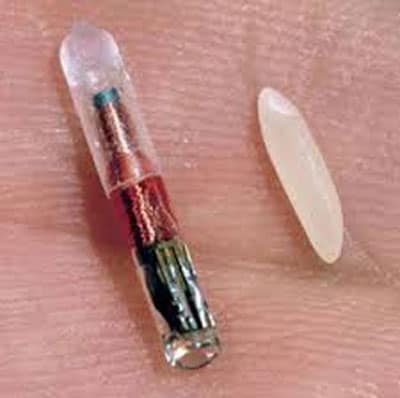Compulsory Microchipping England Scotland and Wales
Compulsory Microchipping England Scotland and Wales

Key Facts:
All dogs in the UK must be microchipped whatever age
All dogs must still wear a collar or harness displaying an ID tag (Unless they are working dogs gundogs, police and military) see below under collars and tags
Puppies must be microchipped by 8 weeks
Breeders will be responsible for microchipping and must be recorded as the first keeper
The recorded keepers (where the dog resides) MUST keep contact details up to date on a government compliant database
Full guidance can be found (1) Government Microchip Law (there are varying regulations in Wales and Scotland).
All dog owners and keepers of dogs in England Scotland and Wales are legally required to have their pet microchipped
Since April 6, 2016, any owner or keeper whose dog is not chipped could face a fine of £500 if they fail to act when warned.

Collars and Tags:
Gundogs, working hounds, (such as foxhounds) sheep and cattle dogs are allowed to work without a collar and therefore without a visible tag, so are hounds.
Gundogs can only go collarless when they are actually working.
I know a lot of people that are not aware of this rule and think that because they work their gundogs they never need a collar and tag.
If you are not working your dog then you must have that you can hang a tag on your dogs at all times. whether that it is a stroll in the park or dropping in the local pub your dog should be collared and tagged.
Important Information:
The law pertains to England, Scotland and Wales. Wales initially decided to bring the law in on April 2015 but realised it needed more time before rollout. If you want a handy tag that you can change the details whether you are on holiday or staying with friends in minutes. then check out my famous (2) Doglistener Leads and Collars and IDTags. Maximum 5000 fine for not having a visible ID Tag attached to your dog
,- All puppies must be chipped and registered on an approved database before they hit the age of 8 weeks.
- It does not matter if a person is not the owner – the law applies to the dog’s “keeper”.
- Keepers found not to have had their dog chipped will be issued a warning. They will then have 21 days to act. Fines of £500 can be issued if keepers fail to do so.
- The law will be enforced by local authorities such as councils, plus police and PCSOs. Other persons may also be given permission to enforce the law – for example, RSPCA officers may be authorised. On a personal basis, I do hope the RSPCA is not involved.
- A dog microchip is about twice the size of a grain of rice. However, for smaller dogs there are smaller microchips available if required.
Terminology:
The term owner will not be used, it will be Keepers and Keepership rather than owner and ownership. This act means pups will be traceable right the way back to the breeder and hopefully, this will reduce the practice of illegal puppy farming and possibly inherited diseases, aggression and illegal dogs.
You had initially until the 5th April 2016 to get the dog microchipped, whatever age of the dog. If your dog is found to not have been chipped you will be issued a warning and 21 days to act and get the dog chipped.
Fines of £500 may be given to those who fail to do so. There are no exceptions except for medical reasons. A dog will be legally exempt from being microchipped only when a vet certifies that it cannot be microchipped for health reasons. This needs to done on a form approved by the Secretary of State.
When a dog is transferred, the new owner’s (keeper’s) details must be added to the database. Moreover, if an owner moves home or changes telephone numbers, these details should be updated. Failure to keep these details up to date means that, in the eyes of the law, the dog is no longer considered microchipped and a fine can apply.
What Happens if I Move House:
if the keeper does NOT get their details up to date within 21 days of a served notice, then you will be liable to pay a fine of £500.
What Happens if You Sell or Give Away A Dog
Once again the new keeper is responsible for updating the chip to reflect a change in owner and address the same penalties apply.
Who Will Enforce The Law:
The Microchipping of Dogs (England) Regulations 2014 will be enforced by local authorities, police constables, community support officers and any other person which the Secretary of State may authorise to act as an enforcer of the regulations. The.
 Information for Breeders:
Information for Breeders:
Whilst the dog is still in your keepership you are required by law to Microchip the puppy by the time it is 8 weeks old and register with an approved microchip database. (you must register your details as well as the dogs)
As soon as the dog is with a new owner or keeper they then become liable.
You must ensure the microchip database contact details are up to date (with the new keeper’s information) this should be updated either by yourself or the new keeper
For any dog that is registered to you (on the microchip database), you are likely to be held responsible if the dog has been found to have strayed, bitten or caused any unjust damage.
There are some exceptions in instances where you were not in charge of the dog at the time of the incident.
It is illegal for any breeder to sell a puppy that is not microchipped and registered on a compliant database that meets the legal requirement.
The breeder must always be the first recorded keeper of the puppies on the microchip database. The breeder must provide transfer of keepership documents to the puppy buyer to ensure the new owner can update their details in order to comply with the law.
If you are implanting your puppies yourself and are already trained, you don’t have to do anything differently. If you wish to train to implant microchips you must be trained by a government-approved course eg. LANTRA.
What Details Will Be Recorded On The Database
• The breeder’s licence number (if applicable) and the name of the local authority by which they are licensed.
• The name given to the dog by the breeder.
• The breed of the dog, or a description if it is a crossbreed.
• The sex of the dog. The colour(s) of the dog e.g. blue, brindle, white, or.
• The most accurate estimate of the dog’s date of birth which the keeper can give. If the keeper is the breeder then the exact date of birth should be known.
• The full name and address of the keeper (including the full postcode).
• The contact telephone number(s) of the keeper.
• The name given to the dog by the keeper if different to those already recorded.
• The unique microchip number. (NB: This may be found on the registration certificate issued by the database operator. If this has been lost, someone at your veterinary practice, dog rescue centre or a local authority dog warden should be able to scan the dog and advise the number to help notification of change of keepership or keepers’ details).
NB. Northern Ireland compulsory microchipping was introduced under the Dogs (Amendment) Act (Northern Ireland) 2011.
Stan Rawlinson 2015
Updated May 2020

 Information for Breeders:
Information for Breeders:




